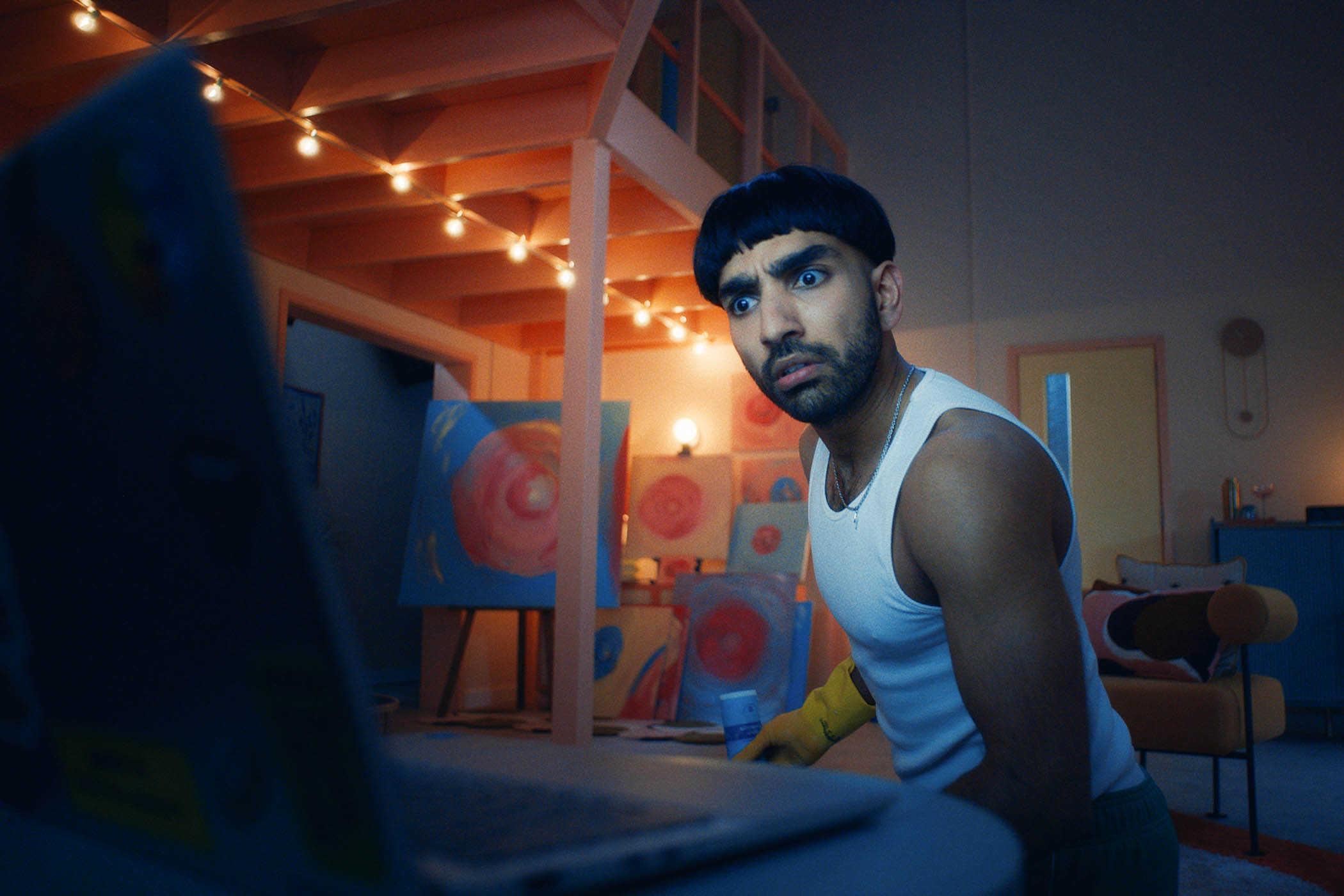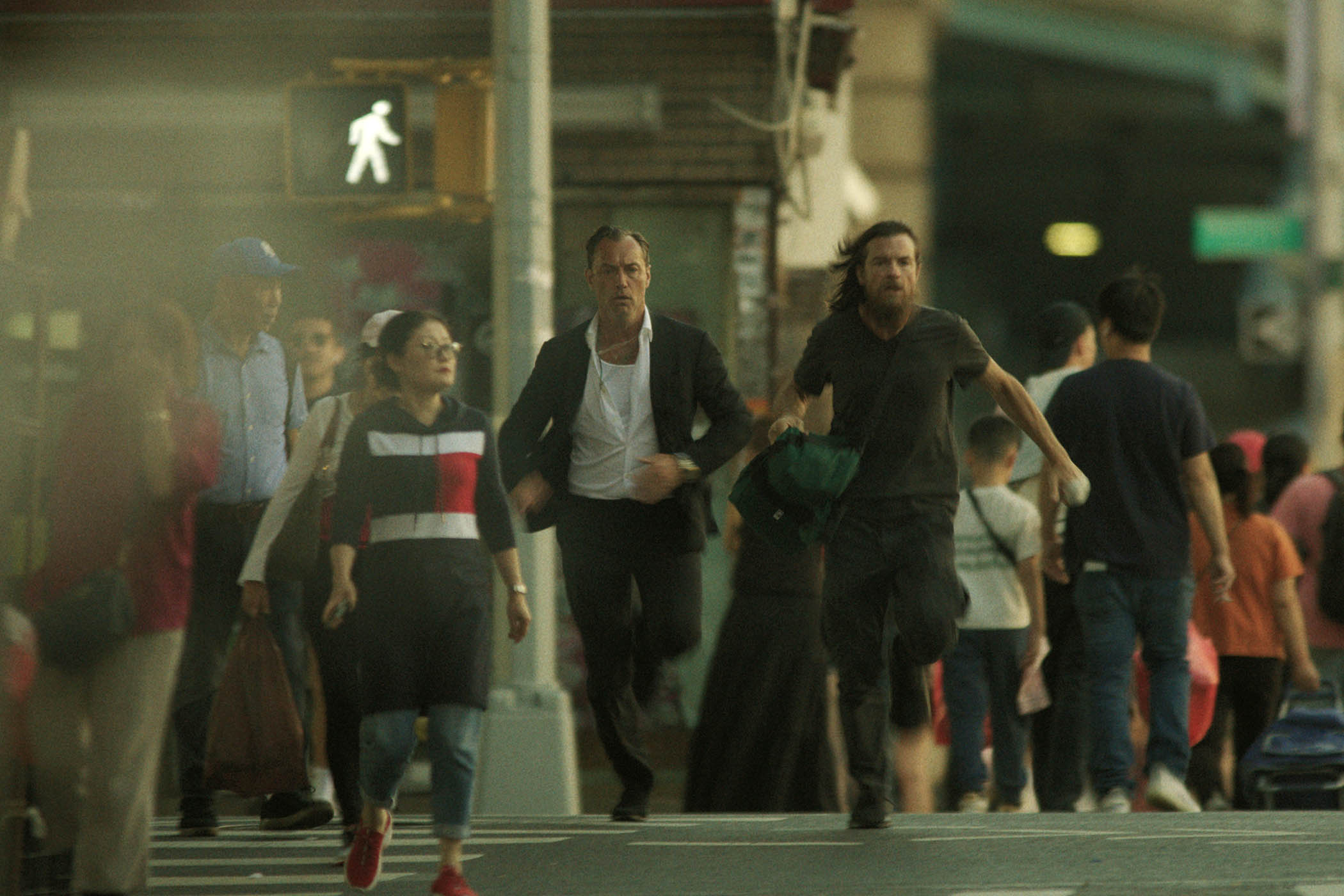To get an idea of Black Rabbit, imagine The Bear reframed as a rambling, discordant crime thriller, revolving around two brothers, and set at a super-hip New York City hotspot. Jude Law plays Jake Friedkin, proprietor of the club and restaurant that gives the Netflix series its title – his character all spivvy suits and cashflow problems.
Jason Bateman is his black sheep brother, Vince, who resembles a bearded Soundgarden roadie (the brothers were briefly in a band). Vince suddenly shows up, dragging criminality and mayhem with him: he owes big money to bad people. From there, Black Rabbit evolves into eight episodes of narrative chaos, and too rarely in a good way.
Created by Zach Baylin (screenwriter of 2024 film The Order, which also starred Law) and Kate Susman, the series starts with an armed robbery at the Black Rabbit, then rewinds to tell the story. Everything is bleak and nihilistic, even the venue itself, which we’re told is achingly hip, but looks like a dump.
As in The Bear, the establishment is waiting for a crucial review, but there’s barely any sense of food or kitchen life here. Maybe this is to distance itself from the culinary porn of that show – all that licking of spoons and basting in pans – but, with the restaurant presented as the nerve centre of the series, the Black Rabbit needs to be a character in itself, when it barely registers as background.
The staff and regulars are presented as a close albeit dysfunctional family, but despite a churn of storylines (including a sexual assault), the characterisation is so slight that most of them come across as napkin doodles.
Of the supporting cast, only Troy Kotsur (who won an Oscar for Coda) resonates, playing a wronged gangster. When Jake has an affair with designer Estelle (Cleopatra Coleman), it’s intended as a raw betrayal of his investor friend Wes (Sope Dirisu), but it feels as surface and meh as a pop video.
It might have made a fine film, instead of what it is: a sluggish, bloated series
It might have made a fine film, instead of what it is: a sluggish, bloated series
This leaves the core dynamic of the Friedkin brothers – the screwed-up Cain and Abel of New York nightlife. Their fraternal bond holds unspeakable trauma, bubbling up like dark lava. Vince is a fraternal hurricane tearing up Jake’s life. Bateman – who directs the first two episodes – fully commits to nervy, fast-talking Vince with his rumpled T-shirts and deep resentments; he’s especially credible when he’s desperate and cornered.
Law plays ambitious, morally dubious Jake well. But do they convince as brothers, even very different ones? Not even slightly. This risible sense of disconnect extends to the jerky timeline, which jumps back and forth with no warning.
Bateman’s Ozark castmate Laura Linney also directs two episodes, and Black Rabbit is successful at evoking the gritty reality of the Big Apple. As events doom-spiral, shuddering sounds and disorienting camera angles build a pervasive unease reminiscent of a 1970s thriller.
The promise of such moments makes you wonder if Black Rabbit could have made a fine, sharply edited film, instead of what it is: a sluggish, bloated series that fails to rise above its star power.
Perhaps Coldwater on ITV1 and ITVX would also have made a better film, but the six-part psychological thriller from Northern Irish playwright David Ireland (The Lovers) is so shamelessly unhinged, I kind of love it. Andrew Lincoln – best known for grappling with zombies in The Walking Dead – plays John, who is already crumbling mentally when a violent incident in a playground unravels him.
In an attempt to solve his crisis and their intimacy problems, he and his wife, Fiona (Indira Varma from Game of Thrones), relocate to the remote Scottish village of Coldwater with their children. Next door, there’s female vicar Rebecca (Eve Myles, recently seen in The Guest) and her Bible-bashing husband, Tommy (Trainspotting’s Ewen Bremner), who has an interest in serial killers.
After John, a night-time runner, stumbles into an even worse calamity, he succumbs to weakness and cleaves to Tommy’s superior strength and confidence. Or is he being controlled?
Coldwater goes nowhere you might expect it to, executing an abrupt swerve off the beaten track. It turns into part-spooky villager thriller, part-study of the collision between post-traumatic stress disorder and toxic masculinity. It’s a tale in which the Highlands scrub is littered with dead bodies but there’s also room for a scene involving a male faith group bonding in a hot tub.
The series is as subtle as a plank in the face, but the script is game, the performances witty and strong, and it’s all so odd, I keep watching long after I realise it’s not going to make any sense. Fans of Tales of the Unexpected, Ben Wheatley’s Sightseers, or Nick Frost’s Get Away – you’re probably sick enough to enjoy this.

‘Riotous and genuinely original’: Mawaan Rizwan in Juice
On BBC Three, it’s the return of Juice, the Bafta-winning comedy from Mawaan Rizwan, revisiting Jamma (Rizwan), a young Pakistani gay man with a savage bowl cut trying to work out life and love. Developed from Rizwan’s Edinburgh fringe show, the first series was bumpy, but also wild, surreal, inventive, and increasingly hilarious with each new episode.
The second series is just as innovative and funny. His life in customary disarray, Jamma is sofa-surfing and working as a clown, or “an events entertainment facilitator”, as he puts it. (“It’s like performance art but very balloon-based.”)
Among other characters, Jamma’s family members return, played by Rizwan’s real-life mother, Shahnaz, and his brother, Nabhaan (Kaos, Industry). Russell Tovey also reprises his role as Jamma’s love interest, the therapist Guy – a man so boring he plans Saturday nights grouting the bathroom. He’s now written a book on relationships.
There’s a cartoonish hyper-realm called Juice World (think an LGBTQ Trumpton), unearthly pastiches (Kevin Eldon as a sinister goth trying to steal Jamma’s soul and Mark Gatiss as a ghost), sperm-splattered sofas, the canned laughter of US sitcoms and a parody of The Shining. A central message of trying not to lose yourself and a romcomesque ending take the laughs somewhere deeper.
This is modern comedy with no downtime – riotous and genuinely original. Don’t miss it.
Photograph by Netflix/BBC/Various Artists Limited
Newsletters
Choose the newsletters you want to receive
View more
For information about how The Observer protects your data, read our Privacy Policy

